Many women experience bloating as one of the uncomfortable symptoms of their menstrual cycle. This unwelcome side effect can leave you feeling uncomfortable and self-conscious. Fortunately, there are several strategies you can try to alleviate bloating during your period and make that time of the month a bit more manageable. In this blog, we’ll explore some effective ways to reduce bloating and keep you feeling your best.
- Stay Hydrated:
Believe it or not, drinking more water can help reduce bloating. When you’re adequately hydrated, your body is less likely to retain water, which can contribute to bloating. Aim for at least 8-10 glasses of water a day, and consider adding lemon or cucumber for a refreshing twist.
- Mind Your Diet:
What you eat plays a significant role in how you feel during your period. Avoiding salty, sugary, and processed foods can help reduce bloating. Instead, choose a balanced diet full of fresh produce, whole grains, lean meats, and other healthy foods. This can keep your digestive system happy and reduce gas and discomfort.
Here are some ideas for meals:
A) Hydrating Foods:
– Cucumber slices with hummus or yogurt dip
– Water-rich fruits like watermelon, cantaloupe, and berries
B) Ginger and Peppermint Tea:
– Both ginger and peppermint have anti-inflammatory properties and can help soothe an upset stomach and reduce bloating.
C) Healthy Grains:
– Oats, quinoa, and white rice with veggies are rich in fiber and can help with digestion.
D) Include Protein:
– Skinless chicken, egg whites, cottage cheese, beans, nuts or seeds are good sources of protein and should be included in good amount during the day.
E) Leafy Greens:
– Green leafy vegetables as subji or salads are rich in vitamins and minerals that can help alleviate bloating.
F) Omega-3 fatty acids:
– Include salmon, fatty fish, flaxseeds and walnuts, these are rich in Omega-3, It is important to include omega-3 fatty acids rich foods as has anti-inflammatory properties.
G) Bananas:
– They are high in potassium, which can help regulate sodium levels and reduce water retention.
H) Probiotic Foods:
– Yogurt with live cultures, kefir, or fermented foods like kimchi and sauerkraut can support a healthy gut microbiome.
I) Dark Chocolate:
– In moderation, dark chocolate may satisfy your cravings without overloading on sugar and dairy, which can exacerbate bloating for some.
J) Foods High in Magnesium:
– Leafy greens, nuts, and seeds are good sources of magnesium, which can help with muscle relaxation and reduce cramping.
- Herbal Teas:
Certain herbal teas, like peppermint and ginger tea, have natural properties that can help soothe your digestive system and alleviate bloating. Sipping on a cup of these teas can be a comforting way to ease discomfort.
- Reduce Sodium Intake:
Excess sodium can lead to water retention, making bloating worse. Check food labels for high-sodium content and limit your intake of salty snacks, canned soups, and processed foods during your period.
- Exercise:
While it might be the last thing you feel like doing during your period, regular physical activity can help improve circulation and reduce bloating. Even light activities like walking or gentle yoga can make a big difference.
- Heat Therapy:
Applying a heating pad or hot water bottle to your abdomen can relax your muscles, relieve cramps, and reduce bloating. The warmth can be soothing and provide much-needed comfort.
- Stress Management:
Stress can exacerbate bloating and other menstrual symptoms. Consider incorporating stress-reduction techniques into your routine, such as deep breathing exercises, meditation, or gentle yoga.
- Limit Caffeine and Sugary Foods:
Caffeine and sugary foods can exacerbate mood swings and increase bloating. Reducing your intake of these items may help you feel more comfortable during your period.
Conclusion:
Dealing with bloating during your period can be frustrating, but with the right strategies, you can find relief. Staying hydrated, eating a balanced diet, and incorporating herbal teas, exercise, and heat therapy into your routine can help reduce bloating and make your period more manageable. Remember, it’s crucial to consult with a healthcare provider if your symptoms are severe or persistent, as there may be underlying medical conditions that need attention. With these tips, you can feel more comfortable and confident during your menstrual cycle. It is advisable to speak to a Nutritionist or Dietitian in Mumbai, for further insights on your Diet Program. Transform with Natasha, team of nutritionist and dietitians, can help design your diet plan as per your goals and even help you work on periods bloating diet plan.







